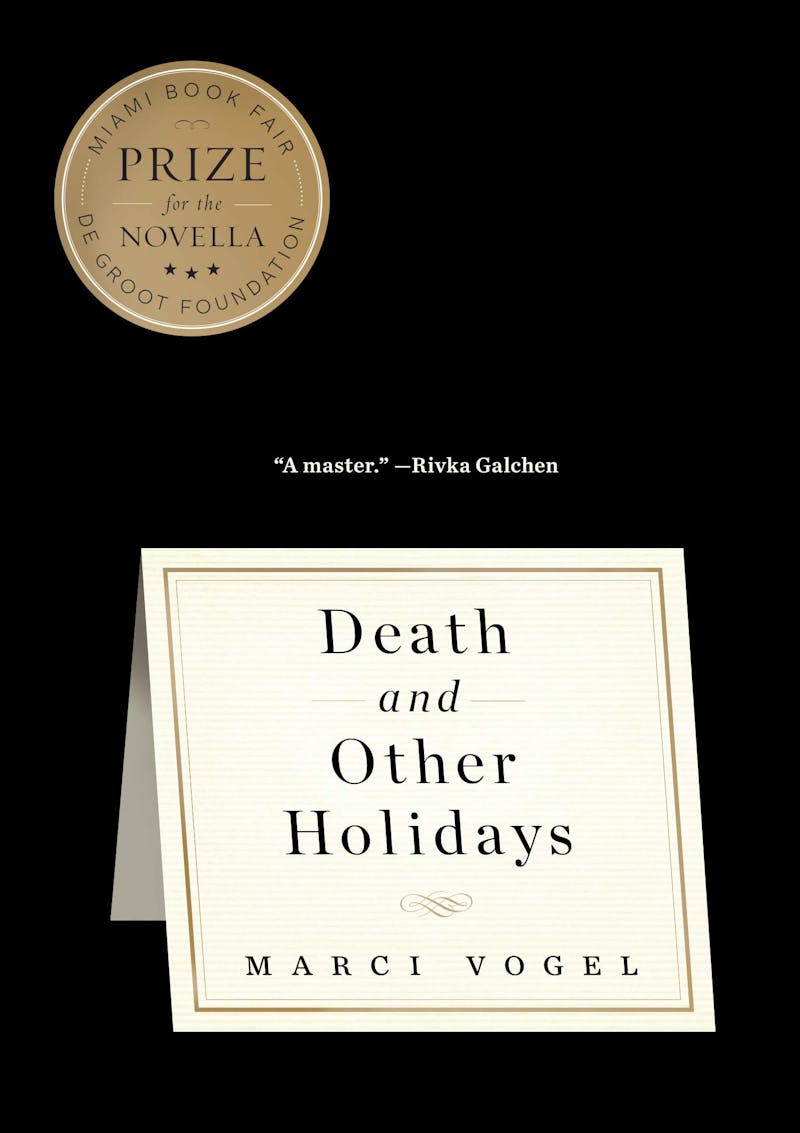The world is impossibly old and disorganized. A long time ago, we began to structure it around the holy days of religion. More recently, the state endorsed holidays for labor and gave the year the rhythm we recognize today. Death, on the other hand, has pretty much always been around. All our customs to measure and commemorate, to recess and celebrate, are recognitions of that fact: that death is the only permanent holiday.

That problem is the point of departure for Death and Other Holidays, the poet Marci Vogel’s debut novella, a coming-of-age story that centers on the recent death of the narrator’s stepfather, and the less recent death of her father. April, the book’s narrator, treats the holidays with bemused curiosity, imputing to them a private ritual of grief, memory, and renewal. The book’s epigraph from Walter Benjamin is a kind of mantra for her: “The initial day of a calendar serves as a historical time-lapse camera. And, basically, it is the same day that keeps recurring in the guise of holidays, which are the days of remembrance.” True to Benjamin’s words, when we meet April she’s contemplating her stepfather Wilson’s camera. Maybe she’ll take a picture each day, like a woman she has read about in the paper, so that her memories won’t slip away.
No wonder she’s preoccupied with preservation. It’s spring 1998 in Los Angeles, she’s in her late twenties, and she has already faced a lot of death. Her father hanged himself when she was 16 years old: “He couldn’t stand it, not one more spring.” Wilson had cancer and wasted away. Her mother greets the sad occasion with finality: “She took down all the get-well cards, tossed the dried-up flowers, his green striped pajamas, the slippers I got him last Father’s Day. It was all done.”
April’s lingering focus on a Father’s Day gift is typical. This is how she marks her life. She guides us impiously through the holidays with no particular deference to denomination, mixing the folkloric and the Judeo-Christian with the commercial and the bureaucratic. The vernal equinox evokes another memory of Wilson: “He showed me once how to balance an egg on its end.” Passover with the aunts entails a visit to her grandmother’s grave, so April and her mother skip it, figuring they’ve countenanced enough death for now. But it remains an occasion for tender and teasing recall: “My grandmother called Passover ‘Holiday,’ like it was the only one of the year.” Still, they never held a proper Seder.
There’s an aching sense, beneath the book’s surface, of the rigid corseting that just barely contains modern life. As a curatorial assistant at the county art museum, April is a public employee, and her state-mandated vacation time practically schedules her nostalgia: “I get all holidays off, paid.” But these “legal holidays,” the book suggests, don’t so much give us time to pause and reflect as to do more and more stuff. She relishes minor chores like wedding-dress shopping with her friend Libby, but even there she hears a morbid thrum: “There must’ve been five thousand gowns, all zipped into clear plastic bags, looking like bodies in shrouds.”
Death and Other Holidays is the rare book that treats relentless, humdrum grief with humor and pathos—and without a shred of sentimentality. Before its publication, it won the Miami Book Fair/de Groot Prize for the Novella, and it’s not hard to see why. It’s a realist work in an unreal world. Vogel honors mortality and our awareness of it as the organizing facts of our humanity. With unparalleled tenderness, she recognizes our celebrations of life as heroic efforts to think about literally anything else. But over the course of one calendar year in April’s life she also reminds us: Death is never far away, try as we might to ignore it.
Vogel is a poet first, and Death and Other Holidays is composed of short bursts of ultra-distilled prose. The simplicity of the details is touching. “I used to have two fathers, but now I have none,” begins the chapterlet titled “Patrimony.” April can barely speak aloud of her father’s suicide, even to her therapist. When she finally does, it’s to a stranger using the abdominal roller at her gym. His father, he tells her, did the same. “So there we were, a son and a daughter of suicides, trying to keep our stomachs strong,” she reflects. The book is full of details like this, unexpectedly intimate moments in commercial space.
April’s stomach is strong against grief, but also against intimacy. At first, she seems detached, passing casually through a series of empty relationships with empty types. Paternal surrogates whom she calls Crash Man, Leaf Man, Math Man, Motorcycle Man, and Critic Man sound like figures from the primitive theater (or else like the level bosses of a Nintendo game). Crash Man can’t stay awake at the wheel. Math Man uses equations to predict the future. Critic Man pronounces her furniture arrangement “dysfunctional.” Each seems to pose a particular menace, and yet each is barely there.
By fall, she has become more serious about photography, developing prints in a darkroom in her closet. With this seriousness comes new insight. “You immerse the paper in a tray of fluid until an image appears, slowly at first, then all at once, as if you were recalling something you forgot.” The camera, with its more-seeing eye, not only captures but remembers. Vogel lets us wonder at it with her: “It’s a mystery how I could have been right there and have missed so much, in my mind, I mean, not the actual shot.” A Fourth of July celebration at Libby and her fiancé Hugo’s house had come and gone without event. But her photos give her a second look at Hugo’s cousin, Victor (“in a halo of sparklers”), and his dog, Argos (“eyeing the burgers”). The memory of the holiday becomes something new and hopeful.
“All photographs are memento mori,” Susan Sontag wrote. “To take a photograph is to participate in another person’s (or thing’s) mortality, vulnerability, mutability. Precisely by slicing out this moment and freezing it, all photographs testify to time’s relentless melt.” The camera, she argued, arose to capture modern life exactly as it began to change with increasing rapidity, but its images are unreliable and certainly won’t forestall erasure. From the vantage of 2019, the pace of Sontag’s world looks appealingly bucolic. Her point, of course, still holds: The stillness of a photograph is confirmation that its subject isn’t stable.
What will happen to April if she melts her world of frozen moments? To accept the vulnerability of a new relationship is to accept the inevitability of change and death. Fittingly, then, April and Victor come together on Halloween, when he surprises her at Libby and Hugo’s empty house, and Argos, true to his canine namesake in the Odyssey, sniffs her out in her costume. They approach each other wearing disguises of a kind—cat whiskers in April’s case and a hockey mask for Victor—but they’re prepared to shed them.
Vogel, a great observer of American absurdities, allows their relationship to develop against the commercial spectacle of Christmas. Because America has cheerfully emptied the holidays of their traditional meanings, April gets to fill them with something new and strange. Like many Jewish families, hers follows the High Holidays with a celebration of Christmas. Against this hybrid backdrop, she and Victor exchange intimacies near a yard filled with “huge cardboard figures of Santa Claus, Mickey Mouse, Goofy, Jesus, Mary, and Joseph.” This chapterlet, titled “Shelter,” reveals a different kind of nativity scene, one that explodes any notions of security in love. Nothing is permanent. Argos is old. Victor is depressive. “I don’t want to love another man who kills himself,” April tells him. But by now she’s acting with more deliberation and less fear.
Death and Other Holidays has the structure of a comedy, so its last quarter is devoted not just to funerary closure but to Libby and Hugo’s wedding. Vogel’s carefully flat prose bows awkwardly under the weight of the clichés that weddings can’t help but inspire (“It’s a beautiful wedding. Libby is stunning, and Hugo looks good, too”). But it’s this flatness, this insistence on the private and unceremonious against the public and aspirational strains of modern life, that gives the book its odd buoyancy. Victor and Libby, for example, both urge April to show her photographs at a gallery. This only puts her in mind of an old art-school professor who, like Sontag and practically anyone else who’s paying attention today, believes photography is about not just capturing but capturing your version. April resists. “How about let’s start with an album, include the dates and everything,” she tells Victor.
Recently, a Buddhist teacher exhorted a class I attended: “Every morning, say to yourself, ‘I might die today.’” Death and Other Holidays is just such a shining reminder, the kind that poets and Buddhist practitioners are forever whispering to us, in their ways, hoping we’ll absorb them and live just slightly more peaceful, loving lives. Fine, then. Each day is a camera. The holidays are memory markers. Death is hurtling, indifferent, toward us. Greet it all with grace.
